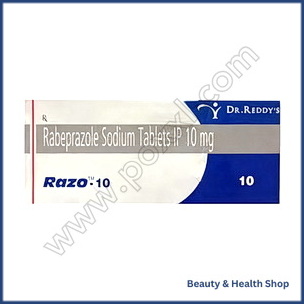ADDICTION
ALCOHOL DEPENDENCE
QUIT SMOKING
ALLERGY
ANTI FUNGAL
FUNGAL INFECTION
FUNGAL NAIL INFECTIONS
ANTI-REJECTION DRUGS
ANTI WORM
ANTIBIOTIC
BACTERIAL INFECTIONS
ARTHRITIS
GOUT
OSTEOARTHRITIS
RHEUMATOID ARTHRITIS
BLOOD
LOW PLATELET COUNT
THROMBOPHLEBITIS
VARICOSE VEINS
COLON
ANAL FISSURE
PILES
ULCERATIVE COLITIS
DIABETES CARE
DIABETES INSIPIDUS
DIABETES TYPE
DIABETIC FOOT ULCERS
GLUCOSE MONITOR
EYES/EAR CARE
DRY EYES
EYE CARE
EYE EXAMINATION
EYE INFECTION
EYE LASHES
EYE PAIN
GLAUCOMA
OCULAR HYPERTENSION
UVEITIS
FEVER CARE
MALARIA
RHEUMATIC FEVER
TYPHOID FEVER
GASTROINTESTINAL
ACIDITY
CONSTIPATION
CROHN'S DISEASE
DIARRHOEA
GALLBLADDER STONES
INTESTINAL ULCERS
IRRITABLE BOWEL SYNDROME
MOTION SICKNESS
NAUSEA
Razo (Rabeprazole)
Razo 10 mg (Rabeprazole)
Razo 20 mg (Rabeprazole)
| Active Ingredient (Generic Name): | Rabeprazole |
|---|---|
| Indication: | Acidity, Heartburn, Stomach ulcers |
| Manufacturer | Dr Reddy’s Laboratories Ltd |
| Packaging: | 15 tablets in one strip |
From: $44.00
Razo (Rabeprazole) is used to relieve heartburn, regurgitation, and stomach pain. It aids in healing esophageal damage, lowers ulcer risk, and enhances quality of life. Take it once daily, whole with water, at the same time for consistency. Consult for dosage adjustments or stopping. Consider special precautions, dietary changes, and medication adherence for best results. Monitor side effects like stomach pain, nausea, headaches, or dizziness. In emergencies or overdoses, contact medical help promptly. Follow-up appointments and consulting healthcare providers are crucial. Purchasing from authorized sources ensures authenticity. Get personalized advice for interactions and dose adjustments, ensuring safe and effective usage.
Start here by taking a closer look at how Razo (Rabeprazole) functions in your body to manage certain gastrointestinal conditions.
Razo is a type of medication known as a proton pump inhibitor (PPI). It works by reducing the production of acid in the stomach.
When you consume food, your stomach normally produces acid to help with digestion. However, in some cases, this acid production can become excessive, leading to conditions like acid reflux, gastroesophageal reflux disease (GERD), or ulcers.
Advantages of Razo Usage
Reducing stomach acid production through Razo (Rabeprazole) usage offers several benefits in managing gastrointestinal conditions like acid reflux, GERD, and ulcers. By taking Razo as prescribed, you can experience relief from symptoms such as heartburn, regurgitation, and stomach pain. This medication helps in healing and preventing damage to the esophagus caused by excess stomach acid. Additionally, Razo can aid in reducing the risk of ulcers in the stomach or intestines, which may develop due to prolonged acid exposure.
Another advantage of using Razo is its ability to improve overall quality of life by alleviating discomfort and allowing you to eat more comfortably. It can also help in decreasing the frequency and severity of symptoms, leading to better sleep and increased productivity. In addition, by controlling acid levels in the stomach, Razo promotes faster healing of existing ulcers and prevents their recurrence. Overall, the advantages of Razo usage lie in its efficacy in managing various gastrointestinal issues and enhancing your well-being.
Why is this medication prescribed?
To treat conditions such as acid reflux, GERD, and ulcers, Razo (Rabeprazole) is prescribed to reduce stomach acid production. Acid reflux occurs when the stomach acid flows back into the esophagus, causing heartburn and discomfort. Razo works by inhibiting the proton pump in the stomach lining responsible for acid secretion. This helps alleviate symptoms like chest pain, difficulty swallowing, and persistent cough caused by gastroesophageal reflux disease (GERD). Ulcers, which are sores in the stomach lining or small intestine, can also benefit from Razo as it aids in healing these ulcerated areas by decreasing acid levels.
Doctors may recommend Razo to patients experiencing frequent heartburn, regurgitation of sour liquid, or stomach pain. It’s important to follow the prescribed dosage and duration to effectively manage these conditions. Razo is usually taken once daily before a meal, and relief from symptoms may be noticed within a few days of starting the medication. If you have persistent or severe symptoms, consult your healthcare provider for further evaluation and management.
How should this medicine be used?
When using Razo (Rabeprazole), it’s important to follow specific guidelines to guarantee maximum effectiveness in treating acid reflux, GERD, and ulcers.
This medication is generally taken once a day, with or without food. Swallow the tablet whole with a glass of water; don’t crush, chew, or split it.
If you have difficulty swallowing the tablet, you can sprinkle the contents on a tablespoon of applesauce and swallow it immediately without chewing. It’s essential to take Razo at the same time each day to maintain consistent levels in your body.
Don’t stop taking this medication without consulting your healthcare provider, even if you start feeling better. Your doctor may adjust your dosage based on your condition and response to the treatment.
Remember to follow your healthcare provider’s instructions precisely to ensure the best results and minimize the risk of side effects. If you have any questions about how to use Razo, don’t hesitate to consult your doctor or pharmacist for clarification.
Other uses for this medicine
Exploring additional applications for Razo beyond treating acid reflux, GERD, and ulcers may reveal its versatility in managing other gastrointestinal conditions and related symptoms. In some cases, this medication is prescribed to reduce the risk of stomach ulcers for individuals taking nonsteroidal anti-inflammatory drugs (NSAIDs) long-term.
Razo can also be used to treat Zollinger-Ellison syndrome, a rare condition where the stomach produces too much acid. Additionally, it may aid in healing erosive esophagitis, a condition characterized by inflammation and damage to the esophagus lining due to stomach acid backing up into the esophagus.
Moreover, Razo could be beneficial in addressing symptoms of dyspepsia, commonly known as indigestion, by reducing stomach acid production. Always consult a healthcare provider before using Razo for conditions other than those it’s primarily prescribed for, as individual medical advice is essential to ensure safe and effective treatment.
What special precautions should I follow?
When using Razo (Rabeprazole), it’s crucial to check for possible drug interactions. Make sure to notify your healthcare provider about all medications, supplements, and herbal products you’re presently taking.
This step helps avoid any harmful interactions that may arise while using Razo.
Check for Drug Interactions
In order to ensure your safety and the effectiveness of Razo (Rabeprazole), it’s essential to carefully check for any potential drug interactions.
- Consult with Your Healthcare Provider: Before starting Razo, inform your healthcare provider about all the medications, supplements, and herbal products you’re currently taking. This will help identify any potential interactions that could affect your health.
- Read Medication Labels: Always read the labels of other medications you’re taking to look for any warnings about interacting with acid-reducing medications like Razo. Understanding these warnings can prevent harmful interactions.
- Report Any Changes: If you experience unexpected side effects or changes in your health after starting Razo, promptly inform your healthcare provider. This information can help in adjusting your treatment plan to avoid adverse interactions.
What special dietary instructions should I follow?
To maintain the effectiveness of Razo (Rabeprazole), it’s crucial to follow specific dietary instructions. It’s recommended to avoid foods and drinks that can trigger acid reflux or worsen your symptoms while taking Razo. These can include pungent foods, tangy fruits, caffeine, alcohol, and greasy or deep-fried foods.
Opt for a diet rich in fruits, vegetables, whole grains, and lean proteins. Consuming smaller, more regular meals throughout the day instead of big meals can also help reduce acid reflux. It’s advisable to eat at least 3 hours before bedtime to allow for proper digestion and prevent nighttime heartburn. Additionally, some individuals find relief by staying away from spearmint, cocoa, shallots, and shallots.
Keeping a food diary to track which foods worsen your symptoms can be beneficial in managing your diet effectively. Remember to discuss any dietary concerns or changes with your healthcare provider to verify they align with your treatment plan.
What should I do if I forget a dose?
If you happen to forget to take a dose of Razo (Rabeprazole), here’s what you should do. If you miss a dose, take it as soon as you remember. However, if it’s almost time for your next scheduled dose, skip the missed dose and continue with your regular dosing schedule. Don’t take a double dose to guarantee its effectiveness in managing your condition.
It’s important to maintain a consistent intake schedule for Razo to ensure its effectiveness in managing your condition. If you have trouble remembering to take your medication, you may find it helpful to set a reminder on your phone or use a pill organizer to keep track of your doses.
If you frequently forget doses or have difficulty adhering to your medication regimen, consider speaking with your healthcare provider for additional support or alternative dosing strategies to help you stay on track with your treatment plan.
What side effects can this medication cause?
When taking Razo (Rabeprazole), it’s important to monitor your symptoms closely as some side effects can be serious. If you experience any of the symptoms outlined in the next section, make sure to contact your doctor immediately.
Your well-being is paramount, and understanding potential side effects can help you manage your health effectively.
Monitor Symptoms Closely
Be vigilant for any adverse reactions that Razo (Rabeprazole) may trigger. This medication, like any other, can lead to side effects that should be monitored closely. Here are some common symptoms to watch out for:
- Digestive Issues: You may experience stomach pain, nausea, vomiting, or diarrhea. These symptoms can indicate a potential adverse reaction to Razo.
- Headaches: Some individuals may develop headaches as a side effect of taking this medication. If you notice persistent or severe headaches, it’s vital to inform your healthcare provider.
- Dizziness: Feeling lightheaded or dizzy can occur in some cases. If you experience these symptoms, especially when standing up quickly, it’s important to pay attention and consult your doctor if they persist.
Some side effects can be serious. If you experience any of the following symptoms, call your doctor immediately:
In rare cases, serious side effects may occur while taking Razo (Rabeprazole), prompting the need to contact your doctor immediately. If you experience any of the following symptoms, it’s important to seek medical attention promptly:
- Severe stomach pain: Persistent and intense abdominal discomfort that doesn’t subside.
- Difficulty swallowing: Feeling like food is stuck in your throat or experiencing pain when swallowing.
- Unexplained weight loss: Significant and rapid weight reduction without changes in diet or exercise routine.
What should I know about the storage and disposal of this medication?
Storing and disposing of Razo (Rabeprazole) properly is important for maintaining its effectiveness and preventing harm to others. To store Razo safely, keep it at room temperature away from moisture and heat. Avoid storing it in the bathroom. Always keep it out of reach of children and pets. Don’t freeze the medication.
If your medication reaches its expiration date or you no longer need it, it’s vital to dispose of it properly. Don’t flush Razo down the toilet unless instructed to do so. Instead, follow guidelines for medication disposal in your area. You can check with your pharmacist or local waste disposal company for the best way to dispose of unused medications. It’s crucial to ensure that no one else can take the medication accidentally.
In case of an emergency/overdose
If an overdose or emergency situation occurs involving Razo (Rabeprazole), promptly contact poison control or seek immediate medical assistance.
An overdose of Razo can lead to symptoms such as confusion, blurred vision, rapid heartbeat, sweating, nausea, or seizures. It’s vital to provide medical professionals with information about the amount of medication ingested and the individual’s current condition. Don’t attempt to induce vomiting unless instructed by healthcare providers.
In case of emergency, go to the nearest emergency room or call emergency services for immediate assistance. Keep the medication container with you to provide necessary details to healthcare providers. It’s essential to act quickly and decisively in situations of overdose to ensure the best possible outcome.
Poison control centers are equipped to offer guidance on the next steps to take in case of accidental ingestion or overconsumption of Razo. Remember, timely intervention can be critical in managing overdose situations effectively.
What other information should I know?
For additional important information about Razo (Rabeprazole), consider consulting with your healthcare provider or pharmacist. It’s vital to inform your healthcare provider about any other medications, vitamins, or supplements you’re taking, as they may interact with Razo.
Be cautious about consuming alcohol while on Razo, as it can increase the risk of stomach bleeding. If you have any liver disease or are pregnant or planning to become pregnant, discuss this with your healthcare provider before starting Razo.
It’s essential to take Razo exactly as prescribed by your healthcare provider, typically before a meal. Don’t crush, chew, or split the tablets; swallow them whole. If you experience persistent stomach pain, nausea, vomiting, or difficulty swallowing while taking Razo, contact your healthcare provider promptly.
Regular follow-up appointments with your healthcare provider are essential to monitor your response to Razo and adjust the treatment plan as needed.
Brand names
When considering the brand names of Razo (Rabeprazole), it’s important to be aware of the specific names under which this medication may be marketed. Rabeprazole is sold under various brand names worldwide, each offering the same active ingredient with potentially different formulations or strengths. Below is a table outlining some of the common brand names of Rabeprazole in different countries:
| Brand Name | Country | Manufacturer |
|---|---|---|
| AcipHex | United States | Eisai Inc. |
| Pariet | Canada | Janssen Inc. |
| Rabeloc | India | Dr. Reddy’s |
| Rabecid | United Kingdom | Aurobindo Pharma |
These brand names may vary based on location and are important to recognize when purchasing or discussing the medication. It is advisable to consult with healthcare professionals to make certain you are receiving the correct product under the brand name known in your region.
Purchase From Authorized Pharmacies
Consider purchasing Razo (Rabeprazole) only from authorized pharmacies to guarantee the authenticity and quality of the medication. Authorized pharmacies are regulated by health authorities, ensuring that they adhere to strict standards for storage, handling, and dispensing of medications. By buying Razo from authorized pharmacies, you reduce the risk of receiving counterfeit or substandard products that may be ineffective or even harmful to your health.
When you purchase Razo from authorized pharmacies, you can trust that the medication has been sourced from reliable suppliers and undergone proper quality control measures. Additionally, authorized pharmacies provide you with the assurance that the medication you’re receiving is the genuine product and not a fake or expired version. Pharmacists at authorized pharmacies are trained professionals who can offer guidance on the appropriate use of Razo and answer any questions you may have about the medication.
To summarise
To summarize, make sure you purchase Razo (Rabeprazole) only from authorized pharmacies for your safety and the effectiveness of your treatment. When acquiring your medication from authorized sources, you guarantee that you’re receiving a genuine product that meets quality standards. This is vital in ensuring the efficacy of the medication in managing conditions like acid reflux, stomach ulcers, and other related issues. By buying Razo (Rabeprazole) from reputable pharmacies, you also reduce the risk of potential harm from counterfeit or substandard products that could pose serious health risks.
Furthermore, authorized pharmacies provide you with the necessary information on the correct dosage, potential side effects, and proper usage of Razo (Rabeprazole). This guidance is essential for maximizing the benefits of the medication and minimizing any adverse effects. By following the instructions provided by authorized healthcare professionals, you can guarantee that your treatment plan is carried out safely and effectively. Remember, your health is paramount, so always prioritize obtaining your medications from trusted sources.












